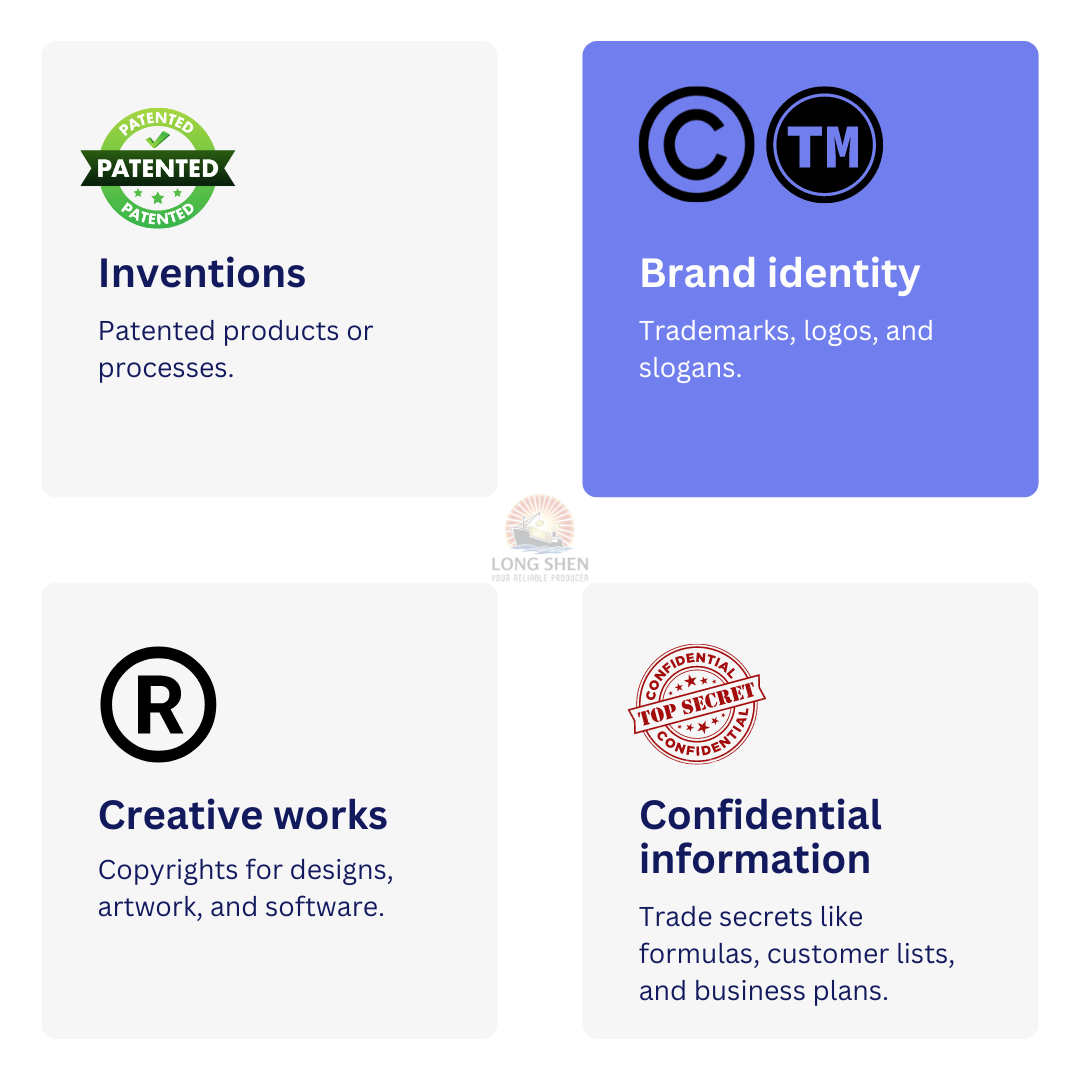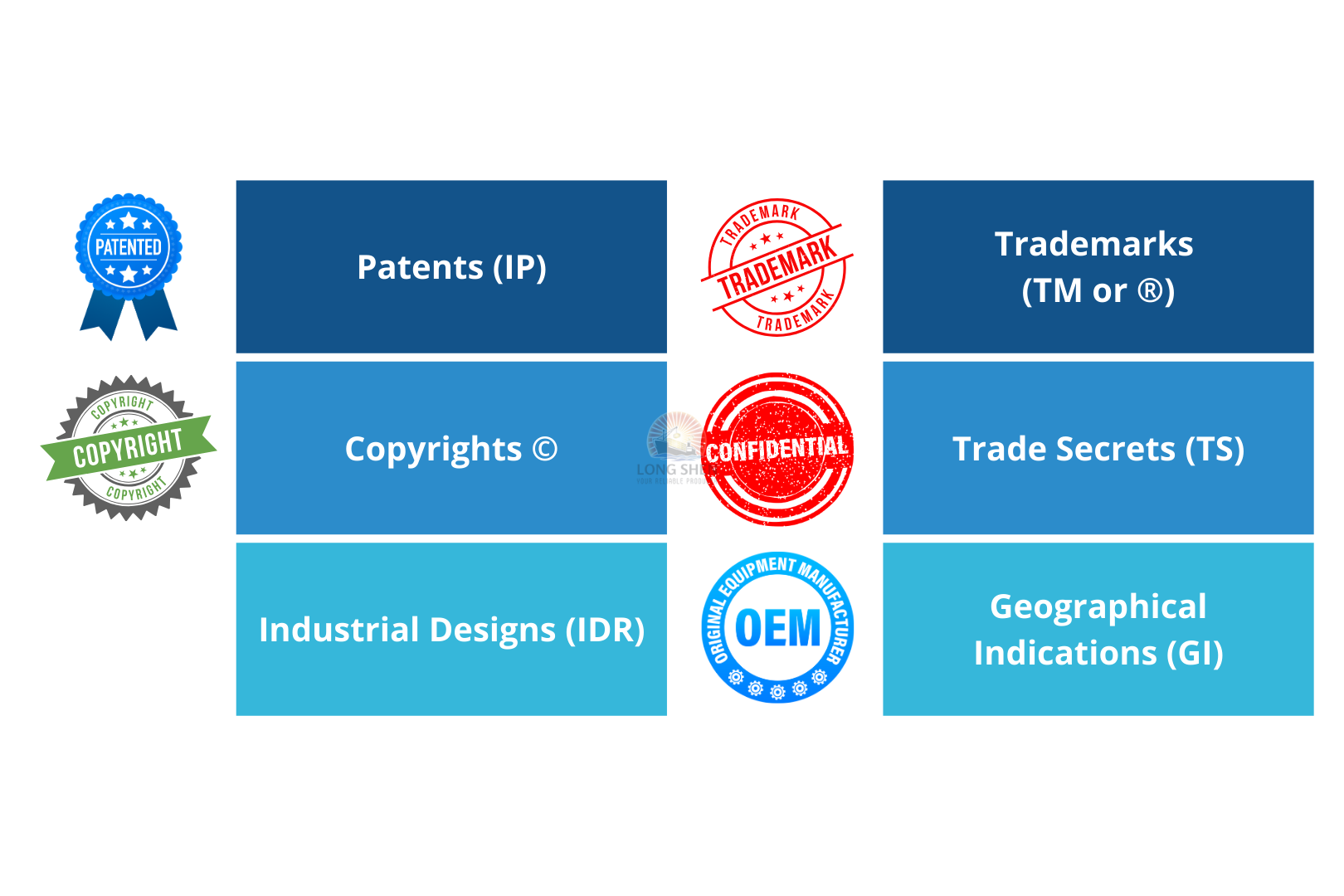What is Intellectual Property?
Intellectual Property (IP) is your business’s most valuable asset. It’s the unique creations of the mind that give your company a competitive edge. This includes things like:

Protecting your IP is essential for safeguarding your business’s success, preventing competitors from copying your ideas, and maintaining your hard-earned reputation.
Types of intellectual property in manufacturing
Intellectual property (IP) encompasses a wide range of intangible assets that are essential to a manufacturing business’s success. Here are the key types of IP:

Patents:
Protect inventions and processes, granting exclusive rights to use, manufacture, and sell the patented item. Example, a new manufacturing process for producing a more energy-efficient car.
In manufacturing, Patents are important because:
- Safeguards innovative technology: Prevents competitors from copying your invention, giving you a competitive advantage.
- Attracts investment: Patents can signal innovation and attract investors, providing funding for further research and development.
- Generates revenue: Patents can be licensed to other companies, generating additional income streams.
Trademarks:
Safeguard brand names, logos, slogans, and other distinguishing features that identify your products or services. Example: The Apple logo or the Coca-Cola name.
In manufacturing, TMs are important because:
- Builds brand recognition: A strong trademark helps consumers identify and associate with your products or services.
- Protects reputation: Prevents others from using your brand name to sell inferior or misleading products.
- Facilitates licensing and mergers: Trademarks can be valuable assets in licensing deals or mergers and acquisitions.
Copyrights:
Protect original creative works such as designs, artwork, software, and marketing materials. Example: The design of a product packaging or a piece of software code.
In manufacturing, © are important because:
- Prevents unauthorized use: Protects your creative content from being copied or used without permission.
- Protects revenue streams: Copyrights can help generate revenue through licensing or sales of the copyrighted material.
- Enhances brand image: Strong copyright protection can enhance your brand’s reputation as an innovator and creator.
Trade secrets: Protect confidential information that gives your business a competitive advantage, such as formulas, customer lists, or manufacturing processes.
In manufacturing, TS are important because:
- Maintains a competitive edge: Trade secrets give your business a unique advantage over competitors.
- Prevents unfair advantage: Protects valuable information from being disclosed to competitors.
- Can be a valuable asset: Trade secrets can significantly increase the value of your business.
Industrial Design Rights (IDRs):
Protect the ornamental appearance of a product, including its shape, configuration, or pattern. For example, the distinctive design of a chair or the unique shape of a smartphone could be protected by an IDR. Example: A secret recipe for a popular soft drink or a proprietary manufacturing technique.
In manufacturing, IDRs are crucial for:
- Protecting unique product designs: Preventing competitors from copying distinctive features.
- Enhancing brand identity: Strengthening brand recognition and differentiation.
- Encouraging innovation: Incentivizing investment in product design and development.
Geographical Indications (GIs):
Indicate the origin of a product and its unique qualities attributed to that place of origin. GIs are signs that indicate the origin of a product, and its unique qualities are attributed to that place of origin. For example, “Champagne” is a GI associated with sparkling wine from the Champagne region in France.
In manufacturing, GIs are important for:
- Protecting regional products: Preserving the reputation and quality of products associated with specific geographic regions.
- Promoting local economies: Supporting regional producers and economies.
- Preventing misrepresentation: Preventing the misuse of geographic names to mislead consumers.
By understanding the different types of IP and how they apply to your business, you can take the necessary steps to protect your valuable assets and drive innovation.
Why Protect Your Intellectual Property?
Protecting your intellectual property (IP) is crucial for several reasons:

- Maintaining a Competitive Edge: Your IP is what sets your business apart. By safeguarding it, you prevent competitors from copying your ideas and gaining an unfair advantage.
- Increasing Business Value: A strong IP portfolio can significantly increase the value of your company. Potential investors and buyers often look for businesses with robust IP protection.
- Protecting Your Reputation: Counterfeit products and IP infringement can damage your brand’s reputation and erode customer trust.
- Generating Revenue: Licensing your IP can create additional revenue streams for your business.
- Compliance with Regulations: Many industries have specific IP protection requirements that must be met.
By understanding the importance of IP protection, you can take the necessary steps to safeguard your business’s success.
Protecting Your Intellectual Property: Key Strategies
Protecting your intellectual property (IP) requires a multi-faceted approach. Here are some key strategies to consider:

Understanding Your Intellectual Property
A comprehensive understanding of your intellectual property (IP) is foundational to effective protection. Begin by conducting a thorough IP audit to identify all assets, from patents and trademarks to copyrights and trade secrets. Prioritize these assets based on their value to your business, focusing protection efforts accordingly. Detailed documentation of IP creation and development processes is crucial for proving ownership and originality, providing a strong foundation for legal protection.
Leveraging Legal Protection
To safeguard your intellectual property, explore the appropriate legal avenues. Patents protect inventions and processes, while trademarks safeguard brand identities. Copyrights secure original creative works, and trade secrets protect confidential information. Consulting with an intellectual property attorney can clarify the best protection strategy for your specific needs. Remember to prioritize and allocate resources effectively based on the value and vulnerability of each IP asset.
Empowering Your Employees
Your employees play a pivotal role in IP protection. Implement comprehensive training programs to foster a culture of IP awareness. Require employees to sign confidentiality agreements to protect sensitive information, and establish clear ethical guidelines for handling confidential data. By empowering employees with knowledge and responsibility, you create a strong first line of defense against IP infringement.
Fortifying Physical and Digital Security
Safeguarding physical and digital assets is essential for IP protection. Implement robust access controls to restrict entry to sensitive areas and information. Secure storage for physical assets such as prototypes and designs is crucial. In the digital realm, employ firewalls, antivirus software, and encryption to protect against cyber threats. Regular data backups provide an additional layer of security.
Building Strong Partnerships
Non-disclosure agreements (NDAs) are vital for protecting confidential information when collaborating with external parties. Develop standardized NDA templates for various levels of confidentiality and be prepared to negotiate terms. Ensuring the legal soundness and enforceability of NDAs is essential to safeguard your IP.
Vigilant Monitoring and Enforcement
Proactive monitoring for potential IP infringement is crucial. Implement systems to detect early warning signs and respond swiftly. Building a strong case for legal action requires meticulous documentation and evidence. Be prepared to protect your IP rights aggressively, both domestically and internationally, if necessary.
By implementing these strategies, you can significantly reduce the risk of IP theft and strengthen your company’s position in the market.
Partnering with Us: A Secure Future
Partnering with Long Shen means choosing a trusted collaborator committed to safeguarding your intellectual property. Our deep understanding of the manufacturing landscape and proven track record in IP protection make us an ideal partner. We offer a comprehensive suite of services tailored to your specific needs, including IP audits, legal counsel, employee training, and security measures.
By working together, we can build a robust IP protection strategy that safeguards your competitive advantage, enhances your brand reputation, and drives long-term business growth.
Conclusion
Protecting your intellectual property is essential for the long-term success and growth of your manufacturing business. By understanding the value of your IP assets and implementing robust protection strategies, you can gain a competitive edge, enhance your brand reputation, and mitigate risks.
Long Shen is committed to being your trusted partner in safeguarding your intellectual property. Our comprehensive suite of services, combined with our deep industry expertise, ensures that your IP is protected at every stage of the manufacturing process.
Let’s work together to build a strong foundation for your business’s future. Contact us today to schedule a consultation and explore how we can help you protect your invaluable assets.



